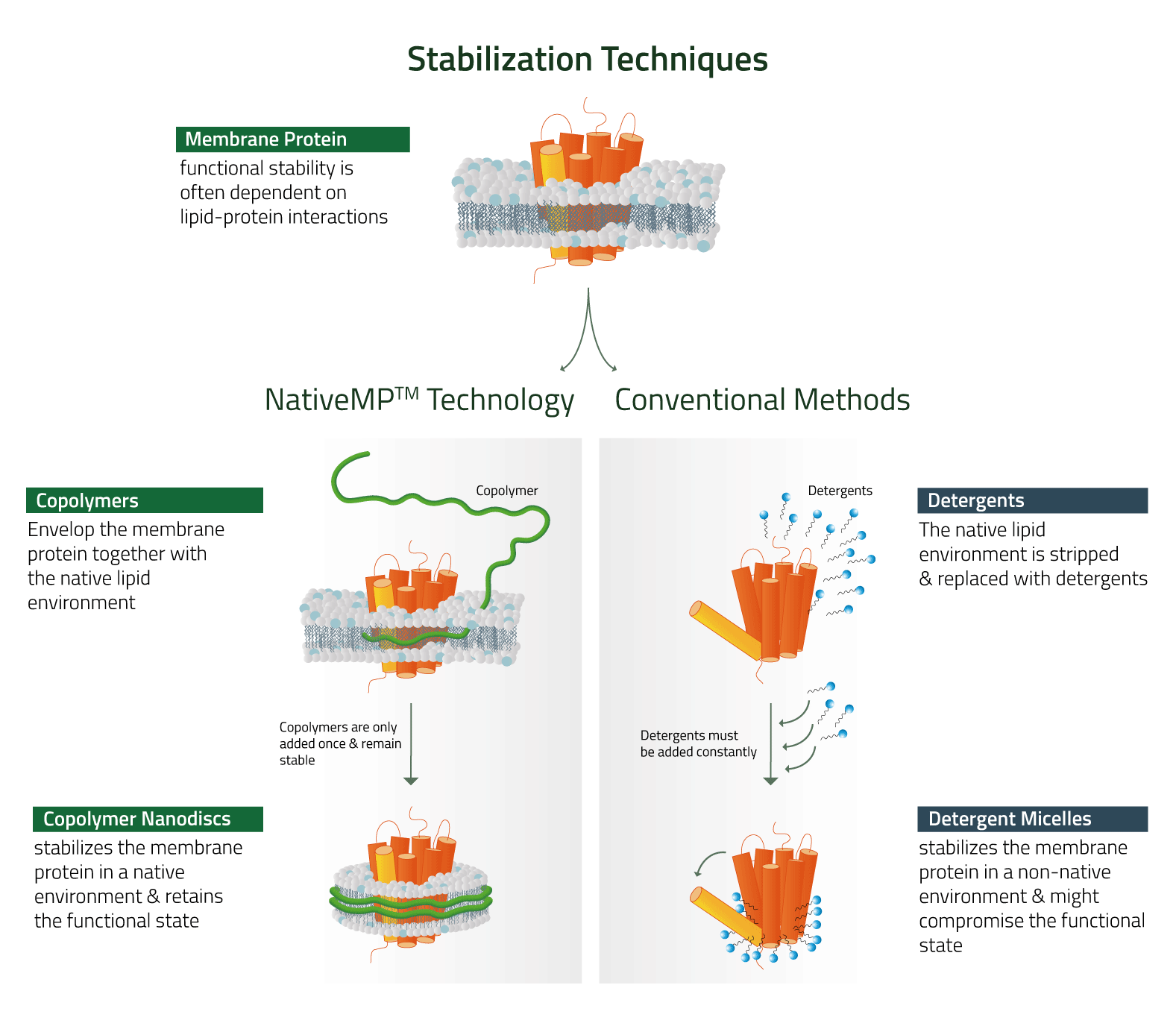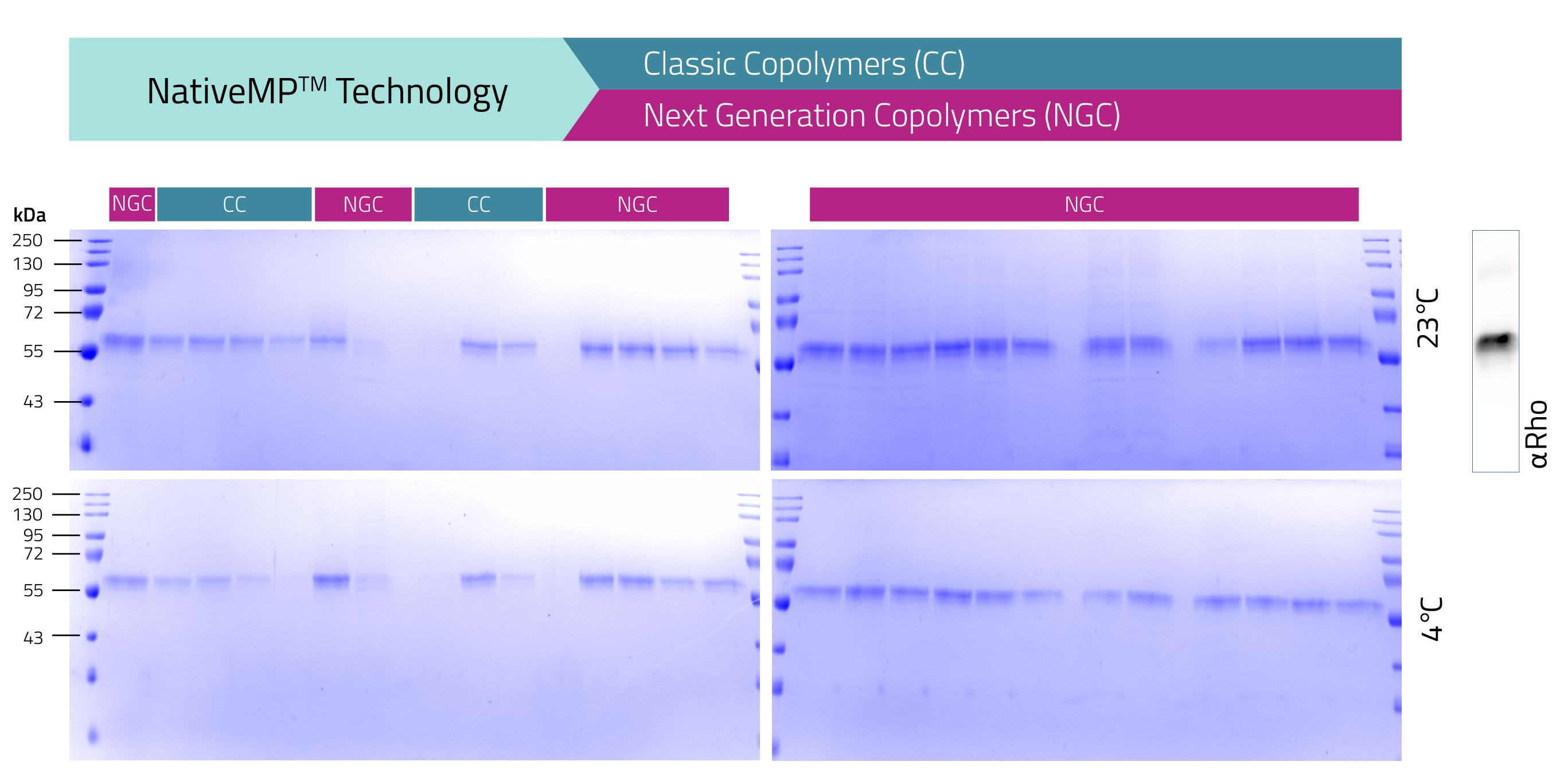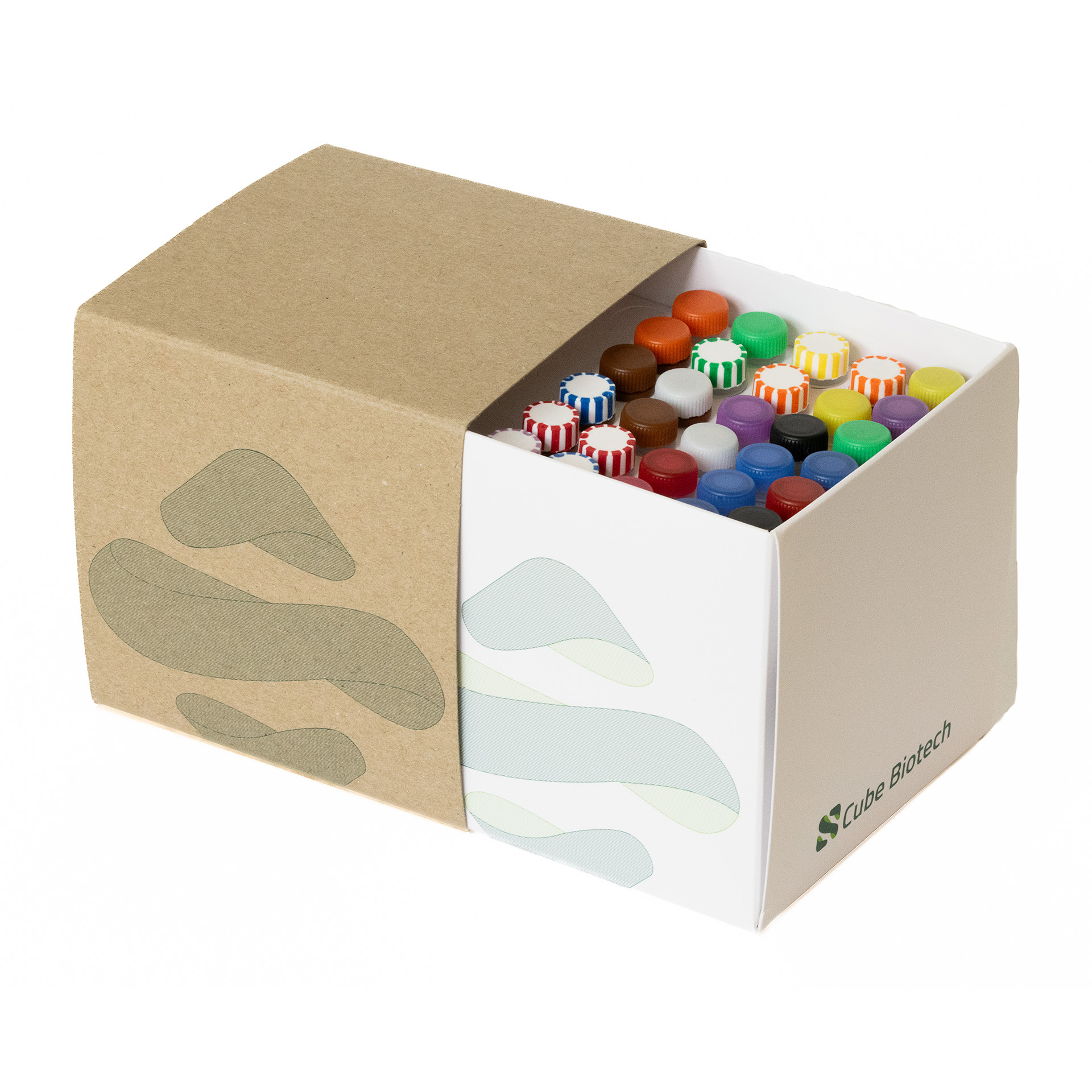NativeMP™ Screening Kit (30x1x50mg)
Order number: 18298
Description
Over 10 years of experience and expertise have culminated in the NativeMP™ copolymer technology featured in this screening kit. Achieve rapid solubilization and stabilization of membrane proteins in a single, detergent-free step.
Membrane proteins are notoriously difficult to stabilize while keeping their structural activity intact. With copolymers, this challenge is tackled by stabilizing the protein together with its native lipid environment. To ensure that you find the best copolymer to suit the unique needs of your membrane protein of interest, we have created a comprehensive selection in this kit. Contact us to learn if it’s suitable for your purposes!
Membrane proteins are notoriously difficult to stabilize while keeping their structural activity intact. With copolymers, this challenge is tackled by stabilizing the protein together with its native lipid environment. To ensure that you find the best copolymer to suit the unique needs of your membrane protein of interest, we have created a comprehensive selection in this kit. Contact us to learn if it’s suitable for your purposes!
Screening is key
Profit from 30 different copolymers derived from five main backbones: SMA, DIBMA, AASTY, Ultrasolute™ Amphipol and our newest innovation Cubipol. Do a screening to find the optimal copolymer for your membrane protein and save time on optimization processes.Innovation Pack
A flexible add-on to the NativeMP Screening Kit meant to give you access to the newest copolymers designed for for membrane protein research. Expand your screening toolkit with the newly developed Cubipol variants: Cubipol PEG and Cubipol Amine. Each offering unique chemical properties to expand stabilization capabilities across challenging membrane proteins.Benefits
- Convenient Process: Copolymers allow for a single-step solubilization and stabilization directly from the cell.
- Temperature Stability: Experiments can be carried out at room temperature and up to 37°C.
- Optimized Stabilization: Preserves the native lipid environment of the membrane protein, retaining its functional stability and avoiding disintegration even of large membrane protein complexes.
- Faster Process: NativeMP™ Technology is 100% detergent-free. Forget about preparing different buffers and constantly having to add detergents to your solution. With copolymers, you avoid that and save valuable lab time.
- Application compatibility: Our copolymer technology is compatible with many sensitive downstream applications like phage display, immobilization via SPR, ELISA, and more.
Datasheets
- DIBMA 10 Datasheet
- DIBMA 12 Datasheet
- DIBMA Glucosamine Datasheet
- DIBMA Glycerol Datasheet
- Glyco-DIBMA Datasheet
- Sulfo-DIBMA Datasheet
- DIBMA 6 Datasheet
- SMALP 140-I Datasheet
- SMALP 140 Datasheet
- SMALP 200 Datasheet
- SMALP 300 Datasheet
- SMALP BZ25 Datasheet
- SMALP BZ30 Datasheet
- SMALP BZ35 Datasheet
- SMALP BZ40 Datasheet
- Sulfo-SMA Datasheet
- AASTY 6-45 Datasheet
- AASTY 6-50 Datasheet
- AASTY 6-55 Datasheet
- AASTY 11-45 Datasheet
- AASTY 11-50 Datasheet
- AASTY 11-55 Datasheet
- Amphipol 17 Datasheet
- Amphipol 18 Datasheet
- Cubipol Datasheet
- Cubipol Glycerol Datasheet
- Sulfo-Cubipol Datasheet
- Sulfo-Cubipol Lite Datasheet
- Sulfo-Cubipol Medium Datasheet
- Glyco-Cubipol Datasheet
- Cubipol PEG Datasheet
- Cubipol Amine Datasheet
Table 1: Shared Features
This table lists the features that each of the 30 copolymers share.
| Feature | |
|---|---|
| Use | Solubilization & stabilization of membrane proteins |
| Buffer | HEPES |
| pH (upon solving in dH2O) | 7.5 |
| State upon delivery | Lyophilized powder |
| Recommended concentration for use | 1% - 5% |
| Shipping Temperature | Room temperature |
| Long-term Storage (lyophilized copolymer) | -20°C for several years |
| Short-term Storage (dissolved copolymer) | 2°C - 8°C for several days |
Table 2: Included SMALP Products
| Feature | SMALP 140 | SMALP 140-I | SMALP 200 | SMALP 300 | Sulfo-SMA |
|---|---|---|---|---|---|
| Molecular weight | 5 kDa | 5 kDa | 6.5 kDa | 10 kDa | 8 kDa |
| Polymerization Type | Free-Radical | Free-Radical | Free-Radical | Free-Radical | RAFT |
| Divalent Cationic Tolerance | < 5 mM | < 100 mM | < 5 mM | < 5 mM | > 100 mM |
| Absorption at 280nm | Yes | Yes | Yes | Yes | Yes |
| Solubility in dH2O | 45% | 38% | 40% | 35% | > 10 % |
Table 3: Included SMALP BZ Products
| Feature | SMALP BZ25 | SMALP BZ30 | SMALP BZ35 | SMALP BZ40 |
|---|---|---|---|---|
| Molecular weight | 5.5 kDa | 5.5 kDa | 5.5 kDa | 5.5 kDa |
| Polymerization Type | RAFT | RAFT | RAFT | RAFT |
| Divalent Cationic Tolerance | < 5 mM | < 5 mM | < 5 mM | < 5 mM |
| Absorption at 280nm | Yes | Yes | Yes | Yes |
| Solubility in dH2O | > 10 % | > 10 % | > 10 % | > 10 % |
Table 4: Included DIBMA Products
| Feature | DIBMA 6 | DIBMA 10 | DIBMA 12 | DIBMA Glycerol | DIBMA Glucosamine | Glyco-DIBMA | Sulfo-DIBMA |
|---|---|---|---|---|---|---|---|
| Molecular weight | 6 kDa | 10 kDa | 12 kDa | 10 kDa | 10 kDa | 10 kDa | 15.7 kDa |
| Polymerization Type | RAFT | Free-Radical | Free-Radical | Free-Radical | Free-Radical | Free-Radical | RAFT |
| Divalent Cationic Tolerance | < 50 mM | < 5 mM | < 5 mM | < 50 mM | < 50 mM | < 4 mM | > 100 mM |
| Absorption at 280nm | No | No | No | No | No | No | No |
| Solubility in dH2O | > 10 % | > 10 % | > 10 % | > 10 % | > 10 % | > 10 % | > 10 % |
Table 5: Included AASTY Products
| Feature | AASTY 6-45 | AASTY 6-50 | AASTY 6-55 | AASTY 11-45 | AASTY 11-50 | AASTY 11-55 |
|---|---|---|---|---|---|---|
| Molecular weight | 5-6 kDa | 5-6 kDa | 5-6 kDa | 10-11 kDa | 10-11 kDa | 10-11 kDa |
| Polymerization Type | RAFT | RAFT | RAFT | RAFT | RAFT | RAFT |
| Divalent Cationic Tolerance | < 6 mM | < 6 mM | < 6 mM | < 6 mM | < 6 mM | < 6 mM |
| Absorption at 280nm | Yes | Yes | Yes | Yes | Yes | Yes |
| Solubility in dH2O | > 10 % | > 10 % | > 10 % | > 10 % | > 10 % | > 10 % |
Table 6: Included Amphipol Products
| Feature | Ultrasolute™ Amphipol 17 | Ultrasolute™ Amphipol 18 |
|---|---|---|
| Molecular weight | 7.3 kDa | 7.3 kDa |
| Polymerization Type | Free-Radical | Free-Radical |
| Divalent Cationic Tolerance | < 10 mM | < 25 mM |
| Absorption at 280nm | No | No |
| Solubility in dH2O | > 10 % | > 10 % |
Table 7: Included Cubipol Products
| Feature | Cubipol | Cubipol Glycerol | Sulfo-Cubipol | Sulfo-Cubipol Lite | Sulfo-Cubipol Medium | Glyco-Cubipol | Cubipol PEG | Cubipol Amine |
|---|---|---|---|---|---|---|---|---|
| Molecular weight | 7.2 kDa | 10.7 kDa | 13.7 kDa | 9 kDa | 11.7 kDa | 12.2 kDa | 7.2 kDa | 7.2 kDa |
| Polymerization Type | Free-Radical | Free-Radical | Free-Radical | Free-Radical | Free-Radical | Free-Radical | Free-Radical | Free-Radical |
| Divalent Cationic Tolerance | < 40 mM | < 20 mM | < 100 mM |
< 40 mM
|
< 40 mM
|
< 40 mM |
< 100 mM |
< 10 mM |
| Absorption at 280nm | No | No | No | No | No | No | No | No |
| Solubility in dH2O | > 10 % |
> 10 % |
> 10 % |
> 10 %
|
> 10 %
|
> 10 % | > 10 % | > 10 % |
| pH Stability Range | 4.5 - 10 | 6 - 10 |
5.5 - 10 | 5.5 - 10 |
5.5 - 10
|
6 - 10 |
6 - 10 |
6.8 - 10 |
Lab Results


Disclaimer
Our products are intended for molecular applications and are not intended for diagnosis, prevention, or treatment of disease.



